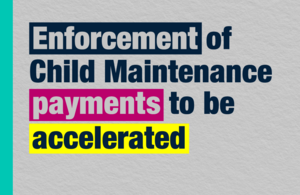Government launches new crackdown on parents who refuse to pay child maintenance
Parents who refuse to pay child maintenance will face accelerated sanctions as Ministers announce the introduction of new powers to speed up strong enforcement action and other reforms to make the Child Maintenance Service (CMS) fairer.

- Government introducing long-term changes to make the system fairer for children and parents
- Enforcement process to be made almost four times faster and non-compliance will be detected and dealt with more quickly
- Application fee will be removed to ensure the service is accessible to all
Today (02/10/2023) the Government is announcing a Liability Orders consultation to speed up enforcement action, the removal of the application fee to the CMS and longer-term changes.
Work and Pensions Secretary Mel Stride said:
Parents need to take financial responsibility for their children. It’s completely unfair that it can take so long to get children support they are due. I am determined to go after those parents who are refusing to pay up when we know they can.
Child maintenance makes a real difference to the life chances of many thousands of children. The CMS can and does enforce compliance, but we want to enable it to act much faster.
DWP Minister Viscount Younger of Leckie said:
We always act fairly and carefully to protect children in separated families so they are supported by both their parents to have a good start in life.
These new powers will improve how the Child Maintenance Service supports children of separated parents, helping families receive child maintenance faster and preventing further arrears.
Liability Orders consultation
A consultation published today lays the groundwork for new regulations that will accelerate tough sanctions on non-paying parents – such as forcing the sale of property – by modernising the enforcement process.
Families will be paid faster as the Child Maintenance Service (CMS) will be able to use an administrative liability order to recover unpaid child maintenance instead of applying to the courts and waiting up to 22 weeks. It’s anticipated this change could reduce the wait for further action to around six to eight weeks.
Around 10,000 parents a year who wilfully refuse to pay maintenance are estimated to be affected by the new liability order regulations, to the benefit of thousands of children and parents for whom child maintenance is a key source of financial security.
Removal of the £20 application fee
There is currently a £20 application fee to apply to the CMS for assistance securing the financial support a parent is owed, although victims of domestic abuse and applicants aged under 19 are exempt.
The Government will remove this application fee for all parents so that children in the poorest families are not unfairly disadvantaged if their parent cannot afford the £20.
Changes to maintenance calculations
The Government will legislate to ensure unearned income, such as savings, investment, dividend and property income, is taken into account automatically when the maintenance calculation is made. This will make it more difficult for the small number of parents who avoid paying the correct amount.
Improvements to collection of payments
The Government has also committed to consulting on the way the CMS collects and makes payments so it can act on non-compliance more quickly. Changes will mean the CMS can use its strong enforcement powers more quickly to go after those who wilfully avoid their financial obligations to their children.
This follows the Child Support (Enforcement) Act 2023 and The Child Support Collection (Domestic Abuse) Act 2023 receiving royal assent in the summer. These Acts provide the basis for the CMS to act swiftly, progressing enforcement action faster with the aim of getting money to children more quickly, establishing compliance, preventing further arrears and bolstering domestic abuse protections for parents.
The CMS helps around 930,000 children get the financial support they are entitled to and between June 2022-2023 arranged a record £1.2 billion on their behalf. Overall, child maintenance payments help to keep 160,000 children out of poverty each year.
The liability order consultation is published here www.gov.uk/government/consultations/child-maintenance-accelerating-enforcement and closes on 24 November.
Further Information
- In the last 12 months, the CMS arranged a record £1.2 billion for children of separated parents.
- There are now 930,000 children covered by the service – an increase of 10% since the end of June 2022.
- The consultation period begins on 2 October 2023 and runs until 24 November 2023.
- The Government proposes to bring into force powers that allow the Child Maintenance Service (CMS) to make an administrative liability order against a person who has failed to pay child maintenance and is in arrears.
- Before escalating to the administrative liability order, which allows for tougher enforcement action, the CMS has other options including collecting earnings direct from parents’ employers or different bank accounts.
- Regulations will set out how the administrative liability orders will operate including appeal rights for paying parents, ensuring they can challenge a liability order where it is right for them to do so.
- As the DWP further legislates this change, it will continue to protect paying parents’ appeal rights so they can fairly challenge any decisions. The new law will apply to Great Britain although Scotland will implement the change separately and at a later date.
- Changes to legislation will also include ensuring unearned income is considered at the initial calculation stage automatically. This was consulted on in 2022 and will make it more difficult for a small number of parents to avoid paying the most appropriate maintenance liability.
Cases involving complex income or suspected fraudulent behaviour can be investigated by the CMS’s Financial Investigation Unit (FIU). For example, to recalculate and collect payments where parents’ incomes do not represent their full wealth and they have money flowing elsewhere such as company dividends
Contact Press Office
Media enquiries for this press release – 0300 046 1007